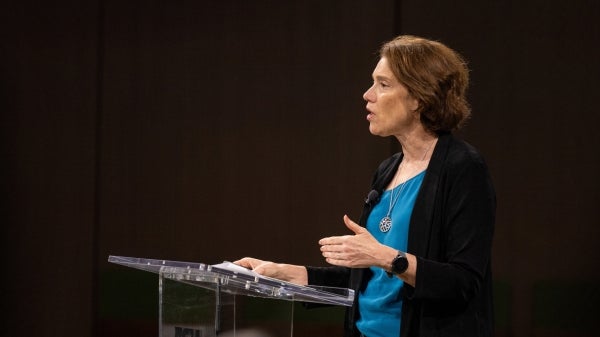The U.N. meeting on climate change in Bonn, Germany Nov. 6–17, or COP23, is expected to draw nearly 20,000 people as nations begin discussions of implementing the Paris climate accord. It is the first meeting since President Donald Trump decided to pull the U.S. out of the agreement and it is an important meeting for working out some of the details, like measuring the carbon emissions of nations and figuring out how to pay for these efforts. Already, Syria has decided to join the climate change effort, leaving the U.S. as the only nation not in agreement.
“We are still part of the Paris agreement,” said Sonja Klinsky, an assistant professor in ASU’s School of Sustainability and a senior sustainability scientist in the Julie A. Wrigley Global Institute of Sustainability. Given the U.S. situation, ASU Now asked Klinsky — who has participated in these meeting in the past — what to expect from COP23, including what role the U.S. could play.
Question: In general, what will happen at COP23?
Answer: This meeting is the second since the Paris Agreement was negotiated. The Paris Agreement provided a framework, but many of the implementation details were left to be negotiated. This two-week negotiation period will continue to iron out these details. For example, some activities will involve setting up rules for how emissions will be measured and possibly traded for those countries that are hoping to create a system that will allow this.
Q: Is this a critical point for the accord, and how it is shaped?
A: We are not at the very beginning, but still have a lot of the structure to fill in. This year and the next several years will continue to be very important. Right now they are trying to build the basic institutions and arrangements that will continue to shape how countries work together for a good long while, probably the next few decades at least. Like any other process, decisions you make early on can have long-term implications.
Q: When is the earliest the U.S. can conceivably pull out of the accord?
A: If the United States wants to pull out of the accord, it will have to file this in writing in November 2019. The process of withdrawing would then take one year from this date, so the earliest the U.S. would be out of the deal would be sometime in late November 2020.
Q: What role can the U.S. play in the Bonn meeting and how effective can we be in shaping the future of the agreement?
A: As a member of the agreement, the United States could play a number of roles. It could continue to work cooperatively with other countries to try to create a set of institutions that will work for everyone for the next few decades as it has done previously. Alternately, it could decide not to cooperate and impede the actions of other countries. We will have to see how this transpires.
These are diplomatic processes, and other countries will be fully aware of the Trump administration’s position on climate change and other global issues. Global cooperation depends on goodwill, trust and mutual compromise. Other countries’ perceptions of the willingness of the U.S. to be a cooperative global actor generally may change how effective it is at promoting its own interests. It is a distinct possibility that the U.S. will have less influence in this arena than it had previously; however it is too early to say whether or not this has happened.
Q: Can local or state governments join in? What about companies?
A: Local and state action on climate change is very important, as is action by companies. While the current rules stop them from becoming full members of the Paris Agreement, there is a parallel process where they can participate by declaring what kinds of actions they are taking, connect with others and share best practices, and generally demonstrate their commitment to innovative solutions.
Q: Is ASU present at the negotiations?
A: ASU has a delegation attending the negotiations. Several School of Sustainability graduate students will be conducting research while they are there. Another student is educating elementary school students about the international process by Skyping into their classrooms from the negotiations. And we have staff and students presenting research about climate solutions at events occurring in parallel with the negotiations.
More Environment and sustainability

Researcher works on changing people's mindsets to fight climate change
Meaningful action to heal the climate requires a complete shift in the way people think and perceive each other, according to an…

NOAA, ASU offer workshop to bridge ocean exploration, education
Oceans are vital to sustaining life on Earth, as they produce over half of the oxygen we breathe and play a crucial role in…

A united front for sustainability and the economy
When four leaders of esteemed learning institutions and the mayor of Phoenix gather in one location at the same time, it’s a tip-…